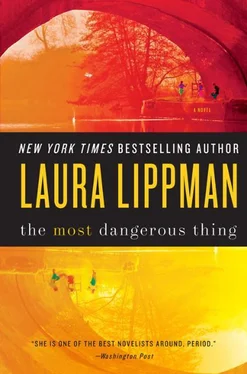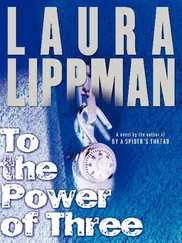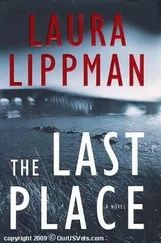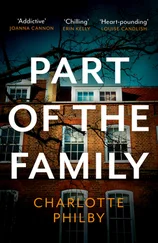He probably was dead when Tim got there. He slipped, he fell, and his lungs filled with water when the children ran to get help. Who can fault them for not staying with him on that dark rainy night? Who would ask them to administer first aid to that monster, lying in the creek? Yes, there was the strange arc of the flashlight going up and down, instead of side to side- Stop, he tells himself. Believe what’s easiest to believe. There’s no harm in it.
He is home now, or almost there, at the peak above his house. Your dream house, as Tally always says. It is. He built a house to his taste on a site that he loved, assuming his wife and children would love it, too, but only Gwen shared his affection for the place. Now even she wouldn’t object to moving, as long as she could continue to be the queen bee of her social set at Park School.
Someone-Clem has no idea who-called children and wives hostages to fortunes. He will never see it that way. His wife and his children are his real contributions to the world. He isn’t demeaning what he has accomplished professionally. He’s good at what he does and enjoys it, the best of all possible combinations. But there is always someone to take one’s place in any profession, no matter how singular or vital. There’s no shortage of men who want to be president or discover vaccines or explore the Amazon. Only Clem can be Tally’s husband, father to Miller, Fee, and Gwen. Only he can love them as he loves them.
As he descends the hill, he realizes that as much as he hates Tim Halloran, he envies him, too. Because Halloran proved he would do anything for his children, whereas Clem couldn’t even give up this jury-rigged, imperfect house. What Halloran did was savage. But it was also love, immutable, enormous love. He killed the man who touched his boy. If a police officer ever shows up on Clem’s doorstep, Clem will sell the others out in a heartbeat, cut a deal for himself. But their silence, their pact, was not simply about avoiding discovery. When they agreed that night to say nothing to anyone else about the man’s death, they condoned what Tim did. He avenged his son. He was a real man.
Something wraps around his ankle, and he starts. It felt like a bird. But it’s only a scrap of paper, a piece of trash blowing through his beloved woods, scampering down the hill toward his house.
Gwen lives in the future. All magazine editors do. Here it is, the last night of March, and she is already focusing on September, which brings the annual “best of” issue, exhaustive and exhausting. When that’s done by midsummer, Christmas will be bearing down on her. Her daughter is dreaming about the Easter bunny, whose arrival is less than a month away, and Gwen is trying to think about “hot gifts for cold nights!” She hopes her copy editors can do better than that.
So she has agreed to her publisher’s pressure to attend the opening reception for the big craft fair, the kind of work duty that she loathes and is usually spared. Her boss once adored attending all these things, but even he is burning out on the endless plastic cups of bad wine and prosciutto-wrapped bits of melon and mini crab cakes. Or perhaps his social interactions are less enjoyable since the magazine has started silting bits of real journalism among the themed guides (best doctors, best neighborhoods, best schools, best restaurants, maybe Tim was on-target with the best prostitutes issue) and shopping-friendly features. Gwen is particularly proud of a recent piece on one of Maryland’s most famous cold homicide cases, the 1980 murder of a nun. The article managed to upset everyone-the nun’s family, the diocese, the newspaper journalists who wrote about the case a decade earlier. Margery, her star reporter, took a measured approach toward the crime, and that seems to have inflamed everyone. The family is desperate to believe that a priest killed the young nun, but Margery’s dispassionate analysis makes a good case that the more likely suspect was a serial sex offender who later died in prison. Meanwhile, the diocese is displeased at the implicit criticism that its knee-jerk circle-the-wagon response to the initial police inquiries probably impeded the investigation in the first place. Gwen thinks it’s a good sign that everyone is unhappy. Her publisher does not see it the same way, but at least no major advertisers were offended.
Yes, maybe it would be a good time to go to the craft fair and start scouting new artisans they could feature. She asks Margery to go with her.
“Am I being punished or rewarded?”
“A little of both. I’ll buy you dinner after.”
At least they don’t have to contend with the crowds that flock to this show once it is officially open to the public, and there are some beautiful things to see. Gwen’s real complaint is that it cuts into her evening with Annabelle, a situation made more problematic by the fact that Karl is out of town again, leaving Annabelle in the care of a babysitter. Annabelle cried on the phone when she called to tell her of the plan. Stoic Annabelle, who seldom cries, her girly-girly tomboy who combines tiaras with cowboy boots. “I ha-a-a-a-a-a-a-a-ate Kristen,” she gulped out in heart-wrenching sobs, and Kristen is her favorite babysitter. When Annabelle was a baby, she cried so seldom that when the tears did come, they were almost a source of marvel to Gwen and Karl. They would stand, transfixed-only for a moment-watching tears roll down their daughter’s face. She was cute when she cried.
But perhaps that was because they were sure they could end her tears easily, something of which Gwen is now less and less sure. She caused her daughter’s tears tonight. She may cause her more. How can she do this to her daughter?
“So you’re still staying at your dad’s and driving over there every morning and night?” Margery asks as they move through the endless aisles of handcrafted goods, their eyes quickly growing numb to all the stimulation. Their goal is to spot things that are local, original, and, if possible, eco-friendly, as their Christmas issue will be built around a green theme.
“It’s barely been a month,” Gwen says. “It’s not so bad.” Actually, it’s awful, just as her father and Karl predicted, but she can’t back down now. Besides, her father needs her, even if he won’t admit it. The daytime aide does the bare minimum. Gwen couldn’t sleep if she had to leave her father in another aide’s care at night.
“When did everyone become a purse designer?” Margery’s voice isn’t loud, but it’s clear and it carries. “Or jewelry designer? When did these become the default professions? You think that between Monica Lewinsky and all those reality-show types who run around with BeDazzlers and glue guns, people would have too much pride to make this crap.”
The woman at the nearest booth shoots Gwen a glance that is at once puzzled and wounded. Gwen shrugs, hoping the gesture serves as a blanket apology for her opinionated friend. To further make amends, she stops, examining this particular crop of purses. They are clutches woven from recycled materials, candy and gum wrappers and newspapers. Not original-she has seen bags like this in other stores and catalogs for the past several years-but well executed. Besides, being of-the-moment is not important in Baltimore.
“Are you from here? Do you have a card?” she asks the woman, who points to a little stand with embossed business cards: LH DESIGNS.
“I’ve only been at this for a few months, but I’ve managed to place my bags in some local stores,” she says. “Are you-”
“Just an editor, not a buyer. Gwen Robison of Baltimore magazine.”
“You looked familiar, but I guess that’s why. I’ve probably seen your picture in it.”
Читать дальше
Конец ознакомительного отрывка
Купить книгу












